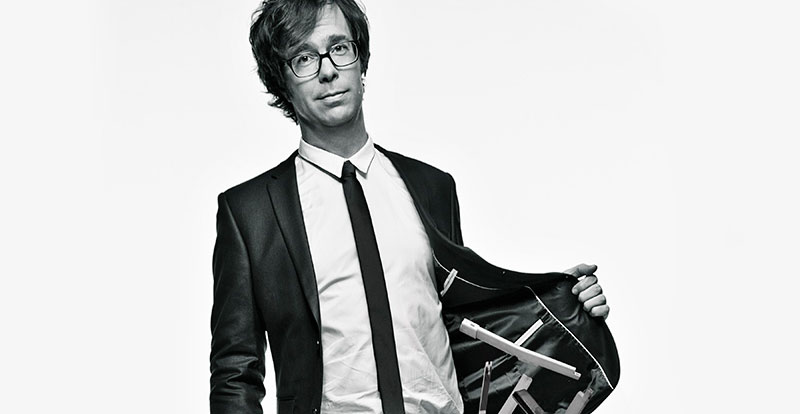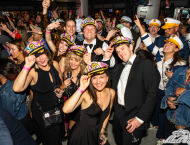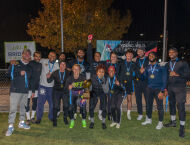Music
 Photo: benfolds.com
Photo: benfolds.com
Ben Folds “Declassifies” Music with Kennedy Center Series
February 11, 2019 @ 12:00am
In 2017, the Kennedy Center announced Ben Folds would join the National Symphony Orchestra as its first-ever artistic advisor. Never one to conform to an ascribed role in the music world, this appointment has seen Folds shape the NSO’s programming, most notably in the form of his Declassified series. On Friday nights at the Kennedy Center, Folds, the NSO and a number of multi-talented, multi-genre artists (think everyone from Sara Bareilles to Kishi Bashi) reinvent and reimagine pop music in the context of the orchestra.
Sound pretentious? It’s not. Folds’ mission is to understand the intricate processes that weave a common thread between pop and orchestral movements that are hundreds of years old. Much like any case where someone tries to build a bridge between two worlds, it’s easy to misinterpret. However, it’s also easy to understand that all music has value and an immense attention to detail that goes into the placement of every note. By merging these worlds, Folds opens the orchestra to non-frequent visitors and performances with the intention for fans of all things classical to learn about the modern musical landscape.
We sat down with Folds before his last Declassified performance, featuring Regina Spektor, to pick the musician’s brain on everything about this series. In serving as the artistic advisor though the 2019-2020 season, Declassified continues with a Valentine’s Day-centric performance, featuring NSO Music Director Gianadrea Noseda and music from Folds himself.
On Tap: It seems like your philosophy in fusing pop with the symphony has been to ignore labels and appreciate the craft behind all music. How has this shaped your work on the Declassified series so far?
Ben Folds: I’m actually OK with labels, there’s just a time to dispense them for a moment. It’s helpful for when things don’t fit into categories nicely. One example would be a modern pop artist like Regina Spektor. You can call her pop, but that makes you think it’s something it’s not. Her melodies have a lot in common with melodies from 150 years ago – they’re timeless. If the melody had been written by Tchaikovsky, it would be treated differently. These are pop artists with great melodies, stories, motifs in their own right as artists. It’s interesting to hear [their music] through this centuries old orchestral process. I find people who attend the symphony often impressed with our new artists. That’s part of what I want to do as well – it’s a two way street.
OT: What does this process of fusing symphonic works with works of a modern pop artist look like?
BF: It’s difficult to sift through all of it. At the same time as I want to sift through some “classical” music so that someone who has never attended the symphony will get the correct context, I want the people who attend the symphony regularly to get the correct context for modern popular music so that they don’t die thinking that it all sucks. This is not a time where we’re dumbing things down. We’re giving ourselves the short end of the stick if we think that. A lot of pop concerts with orchestras are, in my estimation, not done the right way to bring the orchestra in, and that’s something that I’m allowed to really fully work on [here].
OT: So it sounds like you’re more hands-on in the behind-the-scenes process.
BF: It’s a lot of details – it’s not very sexy at all. It starts with the orchestration itself and works its way through the library to the sound people. You don’t amplify an orchestra, you don’t need to. But when you’ve got a pop artist, suddenly you have to turn the speakers on. That creates huge problems if you don’t understand why and how you’re using the orchestra. A good way to explain it would be that the orchestra is a built-in recording studio – built-in faders, production, arrangement, remixes, everything. Before there was recording, if you needed to hear more of an instrument you got them to play louder or you made two of them. There’s a real art to that. The art behind performing a piece of music with an orchestra can be obliterated with electric instruments.
OT: Why is it important for you to be so involved in the orchestration?
BF: There is snobbery in the world of the symphony. Some of it’s imagined, and some of it’s cultivated. If you bring in new people, you have to respect the symphony, which means letting those musicians exist in the environment that they’re paid to work in. The cultural divide is a real one. I can become a snob really fast if someone starts attacking the thing I feel like I’m good at. I try to listen and be in contact with all of the compartments.
OT: You’re the NSO’s first-ever artistic advisor. What has your experience been in this role so far?
BF: My experience is in the blend of the orchestra with pop music. I see this as something that every orchestra in the country does. I would like the NSO to be leading the way in how it’s done. This is the nation’s symphony orchestra – it ought to be the one we look to for ideas. There should be things we can experiment with, we’ve got the money and the talent here to try it out. Maybe a small orchestra in a small town doesn’t have those resources, so we can take our programs – my office is stacked with scores – and amass a team of orchestrators who are young, between the world of rock and roll and classical music, who are there to do it the “right” way. To me it’s about littering the country with well-written, exciting charts and a method to follow.
OT: Can you tell me about musician Regina Spektor performing in the series? What drew you to her work?
BF: Regina attended the symphony a lot as a little girl, so classical music is just in her bones. She was one of the first people I thought of to have in this Declassified series three years ago when we started it, and it took three years to talk her into it. She always wanted to do it, but she’s like me: I turned these things down a few times before, when I was roughly her age because we both respect the symphony orchestra so much. I think it’s a little daunting of an idea to go into their territory, and perhaps, bust it with a shitty pops concert. She wanted to have control over it but have respect for the orchestra. It meant a lot to her and it took a while for me to talk her down from the tree and tell her “we can do this.” She doesn’t do shit that she doesn’t mean or want to do. I don’t think there’s anyone with any more integrity – almost to a fault because it took me so long get her in here. It’s essentially an homage to Russian music.
OT: How are other performers involved such as the band and tap dancer Caleb Teicher?
BF: Caleb is premiering a piece called “Cascade,” which is one of the few classical pieces for tap dance and orchestra. One thing I want to get across about this program is that it’s not possible in a place that doesn’t have these kinds of resources. Normally when you premiere a new piece like Caleb’s, it’s a big deal. We’re just tossing it onto the front of the show. Every single Regina Spektor song is a brand new orchestration done especially for the show that may never see the light of day after. The expense of that, the effort, finding the orchestrators to do it – this band makes it look all too easy.
OT: What has the response been to the Declassified series so far?
BF: Frankly, I’ve been really disheartened by the local journalistic criticism of the show, because I feel like maybe I didn’t do a good job of explaining what we’re trying to achieve. We made it look so easy that they’ve come in and had problems with certain things but I think if they knew what it was, you wouldn’t have a problem with it. The audience doesn’t have a problem with it because they understand that they’re there to learn something about classical music. I think if someone who is naturally a snob about it understands how much respect we have for what it is we’re doing and how we’re trying to integrate the two, the night becomes a little bit more of an experiment. I think we’ve been well understood by our audiences.
OT: Can you elaborate on the disconnect in criticisms that you’ve seen so far?
BF: The two criticisms I’ve seen of these shows weren’t particularly negative, they just didn’t understand what we’re trying to achieve. When you’re going to critique something, the first thing you have to know is ‘what are they trying to say?’ and ‘was that successful?’ So if you’re Bob Dylan and someone comes to the show thinking he’s going to sing like Pavarotti, you’d have a gross misunderstanding of what you were seeing and you might give him a terrible review. And in fact, Bob Dylan got a f–k ton of terrible reviews when he started. I think this is very similar. If someone says ‘well they’re not jumping through this hoop and this hoop and this hoop,’ we know that. But what we’re trying to do is so incredibly ambitious that it needs to be seen for the context of what it is. We give people who come to the shows a listening list, and we can see behind this internet curtain that they are actually listening to it after the show. That’s unheard of. So say we didn’t really kill the Beethoven last time – and I know that we didn’t, and the band knows that we didn’t, and the conductor knows that we didn’t – it’s just the way it happened. But people are still listening to that Beethoven piece on Spotify.
OT: So you can see that you’re making an impact and connecting with audiences and bringing these gaps, that’s exciting.
BF: That’s what we’re trying to do. I have one arranger on this show and he comes from rock and roll, he’s self taught, and he does a lot of stuff wrong. But I like having him because his brilliant creativity and even a little bit of his naivete leads to things we wouldn’t normally think of. Now maybe you can laugh at things in his charts, in a friendly way – the orchestra did at some points – and a lot of orchestras would have booed him out of the room. I’m trying to bring these things together so you actually get a result that’s creative. These aren’t ever to be sold as just Regina Spektor shows and she knows that, and that’s the reason she’s in it. It’s featuring her, and she does six tunes, but we’ve all worked really hard. That’s the other radical things about this show – by featuring the orchestra and it being a night about music, it’s easy to go “let’s sell it on someone coming in and we can do whatever we want.”
Ben Folds performs with NSO Music Director Gianandrea Noseda and other featured performers as part of the NSO Declassified series on Friday, February 15 at the Kennedy Center. In honor of International Women’s Day on March 8, Folds has curated a performance in the series with comedian Sarah Silverman, musicians Julien Baker and Danay Suarez, operatic soprano Leah Hawkins, and conductor Akiko Fujimoto. For more information on the NSO Declassified series, visit www.kennedy-center.org.
The John F. Kennedy Center for the Performing Arts: 2700 F St. NW, DC; 202-467-4600; www.kennedy-center.com







